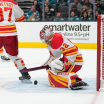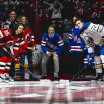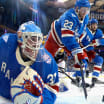The 2022 U.S. Hockey Hall of Fame induction is Nov. 30 in St. Paul, Minnesota. This year's class is made of up Steve Cash, Jim Johannson, Jocelyne Lamoureux-Davidson, Monique Lamoureux-Morando and Ryan Miller. Here, NHL.com staff writer Tom Gulitti profiles Cash.
Cash set to become first sled player in U.S. Hockey Hall of Fame
Three-time Paralympic gold medalist will be inducted Wednesday in 'great feat'
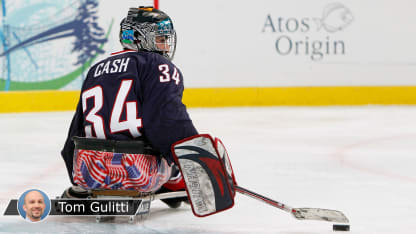
When Steve Cash is inducted into the U.S. Hockey Hall of Fame on Wednesday, he will enter through a door not previously open to sled hockey players.
Others in the sport hope it will lead to the retired United States sled hockey team goalie soon breaking down another one.
"Once the total Hockey Hall of Fame gets their act together, I think he should be the first sled guy internationally in as well," U.S. sled team defenseman Josh Pauls said.
A three-time Paralympic gold medalist and five-time world champion, Cash appreciates the significance of becoming the first sled player in the U.S. Hockey Hall of Fame when the ceremony is held at the Saint Paul RiverCentre.
"There's a lot of pride that comes with it," Cash said. "I grew up watching future Hall of Famers in the Olympics representing the United States. It was kind of my dream to share the same ice as them and I had it etched in my brain that I was going to do it in the actual Olympics, and sled hockey provided me an outlet to do it, just in a different way."
Cash had his right leg amputated when he was 3 years old after being diagnosed with osteosarcoma, a form of bone cancer. Fitted with a prosthetic, he learned to walk and then in-line skate. He got his start like many goalies, facing shots from his three older brothers in their backyard in Overland, Missouri, when he was 5.
"I still remember the green and purple Teenage Mutant Ninja Turtles roller skates that I had," Cash said. "That definitely provided me with some therapy that I needed to improve my balance and coordination on the prosthetic. Then, my brothers saw what I could do on my prosthetic, and they definitely didn't take it easy on me."
Following his brother James, who also was a goalie, Cash excelled playing roller hockey and stand-up ice hockey. Mike Dowling, who helped found the Disabled Athlete Sports Association (DASA) St. Louis Blues sled hockey team in 2002, met Cash at a roller hockey tournament in July 2004 when he was 14.
"The manager of the roller rink came up to me and said, 'You should go talk to that boy over there. His name his Steve. He would probably be good at sled hockey,'" Dowling said.
Cash had not heard of sled hockey but was intrigued, particularly after Dowling showed him a video of the U.S. winning the gold medal at the 2002 Salt Lake Paralympics.
"My whole life I was exposed to able-bodied sports, so playing in-line hockey was kind of where my roots were," Cash said. "So, when I heard about sled hockey, I was like, 'I'll give it a try. It's hockey.' I wasn't sure what to expect and, I'll be honest with you, it was one of the biggest challenges getting into a sled and trying to maneuver around in it and get used to the basic mechanics of it."
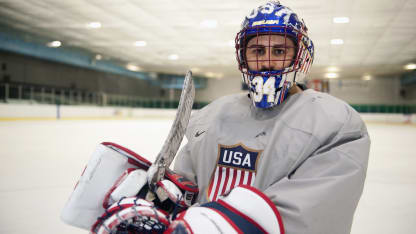
© Jason Connolly/Getty Images
But Cash quickly realized much of what he learned as a stand-up goalie about positioning, playing angles, steering the puck to the proper place, and controlling the game translated to sled hockey. The biggest difference was sled players can pass to themselves under the sled and shoot with sticks in each hand.
Cash meticulously customized his sled and his stick by changing the angle of the shaft depending on whether he wanted the blade flat on the ice or in a better position to play the puck. Seeking quickness and agility, he wore a shin guard on his leg instead of a bulkier pad.
"He was a goalie the very first time he sat down in a sled, and he tweaked, he adjusted his sled and made it fit him," Dowling said. "Once he figured out and made his sled to fit him, he was light-years ahead of anyone that's tried to get into sled hockey and be a goalie."
About a year of taking up the sport, Cash won the backup goalie job at the national team tryouts, earning the chance to represent the U.S at the 2006 Torino Paralympics as a 16-year-old and winning a bronze medal. Dan Brennan, who became director of the sled national teams for USA Hockey shortly after 2006 Paralympics, immediately noticed Cash's competitiveness and credits him with pushing the sled hockey program to the next level.
"He was very contagious," Brennan said. "Our team now is light-years better than any team that's represented the U.S., and it started with Steve setting a bar, a commitment bar, an attitude bar and a compete bar. Having him in the room changed everything."
Cash, nicknamed Money by teammates, helped the U.S. win the Para Sled Hockey World Championship in 2009, 2012, 2015, 2019 and 2021, finish second in 2013 and 2017 and third in 2008. After the bronze medal finish at the 2006 Torino Paralympics, the U.S. won gold with Cash as its No. 1 goalie at the 2010 Vancouver Paralympics, the 2014 Sochi Paralympics and the 2018 PyeongChang Paralympics.
Cash was 103-16-7-33 (W-OTW-OTL-L) with a 1.22 goals-against average and .898 save percentage in 16 seasons with the U.S. before retiring in 2021.
"He was great before the rest of us were great," Pauls said. "Once the rest of the team got up to his level and met his work ethic, his skill level, then you saw us having that success."
Cash's most impressive performance came in Vancouver in 2010, when he set a Paralympic record with five shutouts and did not allow a goal. The 33-year-old lists a 2-0 victory in the gold medal game against Japan, including his glove save on Takayuki Endo's second-period penalty shot, among his best memories.
"Who knows if I didn't stop it and let it in and then we ended up losing that game?" Cash said. "You just never know where the team would end up."
Dowling noted that Cash's greatest accomplishment is being a cancer survivor from 3 years old. What Cash did after that earned him a place among the best U.S.-born hockey players.
"He belongs in the Hall of Fame in Toronto," Dowling said. "We'll accept him going in up in Minnesota. For the sport, it's groundbreaking. He's set the bar very, very high and propelled the sport in amateur hockey terms from B level to professional."
Cash views his induction as a chance to thank those who helped him along the way, beginning with his brothers and parents to Dowling, Brennan and his coaches, including the late Jeff Sauer, and his teammates.
"It's still sinking in for me," he said. "But I definitely think it's a huge step for the sport of sled hockey and it's definitely going to help create a little bit more exposure that I think we've kind of been waiting for.
"So, to be the first to do it, I know it's a great feat, but I know I won't be the last one, for sure."


